The Aviation Science program prepares students to become professional pilots or flight operations specialists. The program can be tailored to meet the needs of individual students and is designed for students without any flying experience.
A student seeking a career as a professional pilot would progress through the aviation pilot training curriculum to earn a commercial pilot certificate.
Non-degree seeking students, such as individuals who only need to use an aircraft for personal transportation or business travels, may select individual Certificates of Specializations appropriate to their needs. Each Certificate of Specialization is designed to be completed within one academic semester.
It takes between 18 and 24 months to complete an Associates of Science degree in Aviation Science. Students have the opportunity for optional flight training with commensurate college credit. Earning pilot certifications is not required for graduation but it is desirable for career advancement.
A student seeking a career as a professional pilot would progress through the aviation pilot training curriculum to earn a commercial pilot certificate. Once the commercial pilot certificate has been earned, the student is able to fly, for hire, with commuter or charter companies in order to build experience needed for airline opportunities. Commercial pilot certificate holders may also choose to undergo additional training to become a certified flight instructor.
Below is a guideline of your program schedule for a degree in Aviation Science. Degree requirements can change between academic years, so use this as a guide. It is your responsibility to obtain up-to-date graduation requirements.
A.S in Aviation Science: Program Course Schedule
Required Courses and Recommended Electives available to view in the Course Catalog.
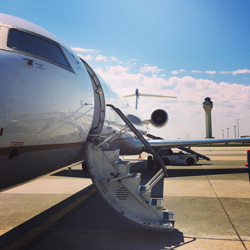 This program of study academically prepares current degree-holders (regardless of major) for entry into the world of commercial aviation. In addition to airline flying many positions are available worldwide for trained commercial pilots such as executive transport for large and small corporations. Government agencies, both federal and state, hire commercial pilots for law enforcement, land management, wildlife management and staff logistics. Pilots are also in demand for fire suppression, emergency medical transportation and on-demand charter.
This program of study academically prepares current degree-holders (regardless of major) for entry into the world of commercial aviation. In addition to airline flying many positions are available worldwide for trained commercial pilots such as executive transport for large and small corporations. Government agencies, both federal and state, hire commercial pilots for law enforcement, land management, wildlife management and staff logistics. Pilots are also in demand for fire suppression, emergency medical transportation and on-demand charter.
The curriculum is designed for students with no flying experience. Courses will systematically prepare individuals academically for the certificates and ratings required to operate aircraft as a commercial pilot. In addition, flight lab courses are offered as suggested electives enabling the student to complete all aspects of their training under the auspices of the college and to accrue the flight hours necessary for licensing as a commercial pilot.
The course of study can be tailored to individual requirements. The small business owner who only needs to use an aircraft for personal transportation can end their training with the Private Pilot Certificate of Specialization (Semester 1) or continue on through Semester 2 in preparation for the Instrument rating. A student seeking a career as a professional pilot would progress further through the curriculum to earn a Commercial Pilot Certificate. All training is conducted in accordance with Federal Aviation Regulation (FAR) Part 61 and Part 141. All flight training labs are conducted in accordance with an approved FAR Part 141 syllabus.
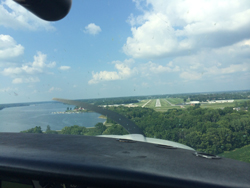
Private Pilot
This certificate prepares students for private pilot flight instruction and the Federal Aviation Administration Private Pilot Knowledge Test. Individuals with a private pilot license may fly, with passengers, within the weather confines of visual flight rules (VFR). Courses introduce basic aerodynamics, aircraft performance, Federal Aviation Regulations, aviation weather factors and cross country navigation procedures. The program meets the aeronautical requirements of Federal Aviation Regulation Part 61.105.
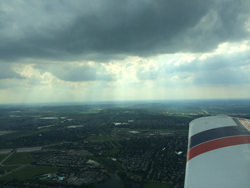
Instrument Pilot
This certificate prepares a pilot who is already in possession of a Private Pilot license to meet the requirements of an instrument rating. Instrument training focuses on specific procedures to fly in weather below established minimums for visual flight rules, or Instrument Flight Rules (IFR). Courses cover principles of instrument flight, Federal Aviation Regulations, and IFR cross country navigation procedures. Emphasis is placed on Instrument Approach Procedures, IFR operational procedures, and IFR cross country navigation procedures. The program meets the aeronautical requirements of Federal Aviation Regulation Part 61.105.
Required courses for Instrument Pilot Certificate of Specialization
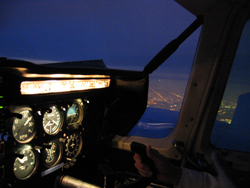
Commercial Pilot
This certificate helps prepare a pilot to meet the licensing requirements to become a commercial pilot, as well as prepare students to take the Commercial Pilot Knowledge Test. A commercial pilot license enables an individual to operate an aircraft, for hire. Topics include transport category aircraft performance considerations, advanced weight and balance, multi-engine aerodynamics, and Federal Aviation Regulations applicable to Commercial pilots. The program meets the aeronautical requirements of Federal Aviation Regulation Part 61.105.
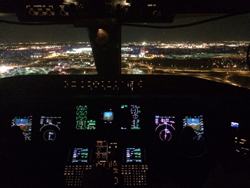
Airline Transport Pilot
This certificate introduces turbine aircraft aerodynamics and systems, weight and balance, and crew resource management. Focus within this certificate will be based on professional interactions within multi-crew operations, high-altitude weather, high speed aerodynamics, and preparing for ground and flight training. This certifcifate also covers explanations of turbine aircraft terminology and procedures. This certificate prepares students for a career in multiple facets of the airline industry.
Required courses for Airline Transport Pilot Certificate of Specialization
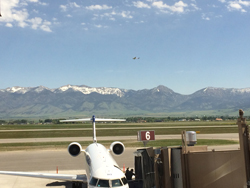
Flight Operations
This certificate introduces basic flight theory, advanced meteorology, airport and airline economics and management, advanced aircraft systems, and aircraft navigation. Courses include topics such as airline and corporate flight operations, airline organization and management, forecasting, scheduling, marketing and fleet selection. In addition, corporate flight operations and the impact of general aviation on the nation’s air transportation system are explored. Potential careers for students include aircraft dispatch, aircraft and aircrew scheduling, airport operations and Fixed Base Operations.
Required courses for Flight Operations Certificate of Specialization
